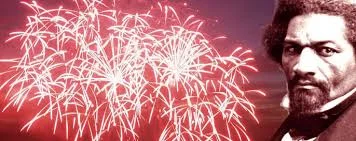Independence Day and Collective Memory
/[Updated: July 6th, 10:58pm]
While I was in college, I used to send a mass email of the text of Frederick Douglass’s memorable speech, “The Meaning of July Fourth for the Negro”. I was a little… hmm… frustrated… at the time by my fresh, more nuanced understandings of how America has functioned in her history –realizations that for many come, unfortunately, after leaving grade school. So I was more than happy to hold up this speech as my rejection of the most exemplary celebration of AMERICA: Independence Day. I was fascinated with the boldness of this oration, given before an audience on July 5, 1852. Not initially printed and distributed, but delivered with the full force of his voice and emotion to folks who I imagine did not sense the irony in inviting a Negro to speak at their July 4th Celebration.
Re-reading this today, I still receive the outrage intended in his delivery, given the fact that Douglass speaks, not only before the abolition of slavery, but during a period of significant land gains for the U.S. out West that signaled the expansion of slavery, and the Fugitive Slave Act of 1850 that strengthened slavery where it already existed and increased the danger for slaves trying to escape to the North. I don’t go so far as to put our current-day injustices on par with the system of slavery Douglass spoke against, but his words still speak to an America today that employs double-speak and platitudes to maintain a patina of infallibility. One where those who downplay the idea of American exceptionalism clearly don’t appreciate how far we’ve come and the racial harmony we’ve achieved. These folks should, I guess, go live in France. Or something.
Yes, this speech is still relevant. Douglass could very well be speaking about the perpetually marginalized who fall very short of whatever dreams are associated with America. Many hold tight to such dreams without complaint (for it is Un-American to complain), but many can identify with his sentiments:
What, to the American slave, is your 4th of July? I answer; a day that reveals to him, more than all other days in the year, the gross injustice and cruelty to which he is the constant victim. To him, your celebration is a sham; your boasted liberty, an unholy license; your national greatness, swelling vanity; your sounds of rejoicing are empty and heartless; your denunciation of tyrants, brass fronted impudence; your shouts of liberty and equality, hollow mockery; your prayers and hymns, your sermons and thanksgivings, with all your religious parade and solemnity, are, to Him, mere bombast, fraud, deception, impiety, and hypocrisy -- a thin veil to cover up crimes which would disgrace a nation of savages. There is not a nation on the earth guilty of practices more shocking and bloody than are the people of the United States, at this very hour.
And if it wasn’t abundantly clear:
Go where you may, search where you will, roam through all the monarchies and despotisms of the Old World, travel through South America, search out every abuse, and when you have found the last, lay your facts by the side of the everyday practices of this nation, and you will say with me, that, for revolting barbarity and shameless hypocrisy, America reigns without a rival....
Many would call this extreme for today, but I, like others who don’t have the luxury to forget, receive the truth in Douglass’s words, and have a greater sense of the collective understanding that we have yet to reach as a nation. Americans are really good at reinterpreting history and defining our way of life by glowing elements from our selective memory with no sense of shame or irony. Douglass didn’t reject the good, but he was eager to speak truth toward a genuine realization of this nation’s ideals of freedom and equality. In fact, he believed a shift was inevitable:
Allow me to say, in conclusion, notwithstanding the dark picture I have this day presented, of the state of the nation, I do not despair of this country. There are forces in operation which must inevitably work the downfall of slavery… I, therefore, leave off where I began, with hope. While drawing encouragement from "the Declaration of Independence," the great principles it contains, and the genius of American Institutions, my spirit is also cheered by the obvious tendencies of the age. Nations do not now stand in the same relation to each other that they did ages ago. No nation can now shut itself up from the surrounding world and trot round in the same old path of its fathers without interference. The time was when such could be done. Long established customs of hurtful character could formerly fence themselves in, and do their evil work with social impunity. Knowledge was then confined and enjoyed by the privileged few, and the multitude walked on in mental darkness. But a change has now come over the affairs of mankind…Oceans no longer divide, but link nations together. From Boston to London is now a holiday excursion. Space is comparatively annihilated. -- Thoughts expressed on one side of the Atlantic are distinctly heard on the other.
His conclusion makes some hopeful assumptions about progress the U.S. (by at least the 21st century, right?) and the world would make and the barriers of geography, knowledge, and access that would be broken. If only he knew we’d still be struggling… So we keep working and teaching and planning to keep this worthy cause on track. I haven’t tried to escape (yet) so I must think it’s worth reaching for too.
I’m still not about the 4th of July though.
Click to read Frederick Douglass’s "The Meaning of July Fourth for the Negro" in full


